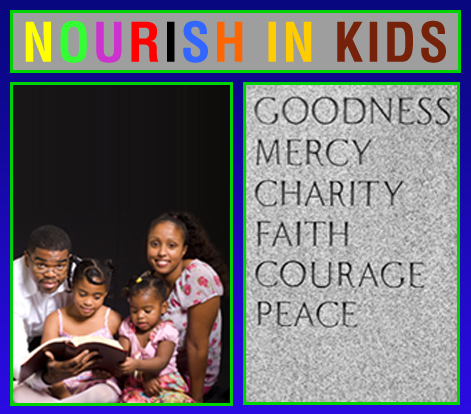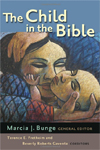|

CHILDREN’S DAY (BIRTH–AGE 12)
(VALUES THAT NOURISH CHILDREN)
LECTIONARY COMMENTARY
Sunday, July 22, 2012
Zebra S. Jefferson, Guest Lectionary Commentator
Minister of Youth and Young Adults, Tabernacle Baptist Church, Augusta, GA
Lection – Exodus 34:5-7 (New Revised Standard Version)
(v. 5) The Lord descended in the cloud and stood with him there, and proclaimed the name, “The Lord.” (v. 6) The Lord passed before him, and proclaimed, “The Lord, the Lord, a God merciful and gracious, slow to anger, and abounding in steadfast love and faithfulness, (v. 7) keeping steadfast love for the thousandth generation, forgiving iniquity and transgression and sin, yet by no means clearing the guilty, but visiting the iniquity of the parents upon the children and the children’s children, to the third and the fourth generation.”
I. Description of the Liturgical Moment
In the United States, the celebration of Children’s Sunday predates some of our nationally observed holidays, like Mother’s and Father’s Day, which became recognized in the early 1900s. Although there is no national observance for children, many denominations, like our Methodist brothers and sisters, since the late 1800s have reserved the second Sunday in June to celebrate children. In the African American church, the celebration of Children’s Sunday is a celebration of one of God’s greatest gifts—our children. It is also a time during which we demonstrate good or bad stewardship over our children (our gifts) by how we provide them with values that will nourish them as people of God throughout their lives.
We celebrate our children for they are our hope for the future. Our children will continue our legacy when we have left this side of the Jordan. They will be the teachers, preachers, doctors, artists, CEOs, and presidents of tomorrow. God mandates that we be good stewards of the gifts given to us. We act as good stewards of our children by inculcating in them the values that matter to God—love, hospitality, justice, concern for the poor, forgiveness, and holiness. This training takes place on Sunday mornings when children are utilizing oratorical and memorization skills, showcasing their God-given talents and gifts, partaking in structured worship, and demonstrating that they are learning to be agents of God.
It also takes place on all days other than Sunday as we take seriously our charge to mediate the environments of our children, not just disseminate information to them. As we mediate their environments, we do so with full knowledge that our acts (good, bad, or ugly), our teachings (biblical and cultural), and our consistency as examples for them will impact their ability to avoid the iniquities of our generation and allow them to present themselves as Christ-centered models for the generations that will follow them.
II. Biblical Interpretation for Preaching and Worship: Exodus 34:5-7
Part One: The Contemporary Contexts of the Interpreter
I remember my participation in my first Children and Youth Sunday. I had been given the honor of bringing the message, not just a brief statement, but the proclamation of the Word of God to the congregation. In fact, children and youth led the entire worship service that day. My message came from the book of Exodus, and I paralleled the journey of the Children of Israel with the journey of African Americans. I was eleven years old! I was extremely nervous, but no matter how bad I thought I was doing, the congregation was affirming and joyous. My church teachers had taught me the Scripture, they had given me a firm orientation of black history, and they gave me the space to be an agent for God and trusted that I would honor my training. They had wisely integrated into worship services a positive pedagogical approach for providing me and all of the children in the church with holy values that nourished us.
Now, years later, I am a minister to children and youth, who has completed a Masters in Divinity from Vanderbilt Divinity School, where I was able to enhance the values and gifts first affirmed in me during childhood. Now it is my tasks to pass on to children under my tutelage the same holy values, the same respect for my culture, and the same belief in creating space for children to allow their holy agency to blossom. In other words, I have the opportunity to pass on things that nourished me.
Part Two: Biblical Commentary
Our lection text takes place with the Children of Israel in the wilderness. The Israelites have been freed from Egyptian bondage with the help of their God-commissioned leader, Moses. They have reached Mt. Sinai after receiving manna from God and water from a rock and after defeating military enemies. Upon their arrival at Mt. Sinai, God consecrates the people, gives them the Law, and provides other laws for them to live by each day.
Exodus 32 records that while Moses and other leaders are on the mountain, the rest of the Israelites become impatient with their leaders and God. They have been left unsupervised for more than a month, and instead of adhering to the commandments and laws given by God, they ask Aaron, Moses’ brother, to make them another god to worship. Aaron caves and honors their request by making a golden calf and an altar for it. They make sacrifices to the calf and celebrate. Meanwhile, back up on the mountain, God informs Moses of the actions of the people. Moses talks God out of bringing ultimate disaster upon the people and God sends Moses down from the mountain to address this idolatry against YAHWEH, who is a jealous God.1
Upon reaching the bottom of the mountain, Moses is enraged by the sight of the people worshipping the calf. In his rage, he throws down the tablets God had given him. Moses then enlisted help to restore order. The men from the tribe of Levi take their swords and go through the camp; three thousand Israelites are killed that day. Then the Lord sends a plague on the people. Moses is again summoned to the mountain and directed by God to bring two cut tablets out of stone to replace the ones he broke. Throughout chapter 33 we see Moses seeking a closer relationship with God for himself and as a means for leading God’s stiff-necked people.
Our pericope picks up with Moses’ return trip to Mt. Sinai. As God passes, he covers Moses with his hand, so that Moses cannot see the face of God. As God descends in a cloud and is passing by Moses, our pericope gives God’s proclamation. This proclamation is layered and begins with God giving his divine attributes. First, by the phrase the Lord, the Lord (YAHWEH, YAHWEH EL) we see that God is sovereign (v. 6). The great I AM that I AM (Exodus 3:14) is speaking. This is the one who “exists dependent upon nothing or no one excepting his own will.”2 It is this sovereignty that makes God the ruler and sustainer of the universe and the only one to whom believers owe total allegiance. Next, our text says God is “merciful and gracious” (v. 6). Here we see the second attribute of God followed by others that we are to nourish in our children, as these are attributes of our Creator. All total they are:
- Sovereign (thus due total allegiance by us);
- Merciful and gracious (as God shows mercy to us and is gracious, we are to treat all others in this manner);
- Slow to anger (since God reacts this way towards us, it must be the way we respond to others);
- Abounding in steadfast love (keeping it even to the thousandth generation); love must always stand as a primary component of the character of our children;
- Faithful (from God to us and therefore we owe faithfulness to God and to humanity as we live into the attributes of God); and
- Forgiving of iniquity, transgression, and sin (God forgives more than we do). What shall we teach our children about the depth of forgiveness they are to display?
After the former divine attributes of God are given and attested by God’s behavior, verse 7b says, “yet by no means clearing the guilty, but visiting he iniquity of the parents upon the children, and the children’s children, to the third and fourth generation.” Although God forgives abundantly, his justice cannot be abrogated. God may not spare us from the consequences of our sins.
Do the sins of the parents visit the child, grandchild, and great-grandchild? If so, then being a parent (biological or otherwise) is a tall order. It is commonly said that children do as they are shown, rather than as they are instructed. Are not parents training their children to go the wrong way by not connecting their actions to their words?
Clearly, God does not punish children for the sins of their parents—see Deuteronomy 24:16 and Ezekiel 18:20. But, children may experience the consequences of the sins of their parents. What form does this consequential visitation take? Children of alcoholics might become alcoholics themselves. Children who are abused by their parents might become abusers and/or suicidal. Parents who are criminals rear children who might become criminals too. Parents who do not value education might produce children who do not value education. Parents who are obese and treat their temples poorly might produce children who do the same.
There is much research on the affect of the parent-child relationship on the child. The patterns of dysfunction in families can manifest in the adult lives of children in so many ways. The statistics are clear—children often suffer the consequences of the sins of their parents, directly or indirectly, and the cycle may continue for many generations. Thus, it becomes imperative on Children’s Sunday and daily that parents and the Church take seriously their assignment to rear children with holy values that nourish the souls and sanctify the lives of children.
Celebration
There is always good news. It is found in this case in Ezekiel 18:20. Here we find that God holds each person accountable for his or her own sin. A child will not be punished for the sins of his or her parents. However, since we do know that children can suffer the consequences of the sinful behavior of their parents, I’m glad that God can still pick up children who were not shown the right road and place them on the straight path. Why? Because God’s love lasts longer than the duration of his punishment. While the consequences of sin may visit three to four generations, the steadfast love of God abounds for thousands of years. Mathematically, thousands outnumbers four any way you count. Yes, the love of God abounds.
Descriptive Details
The descriptive details of this passage include:
Sounds: winds moving as God descends in a cloud and passes by Moses (v. 5); the voice of God proclaiming (vv. 5-7);
Sights: The mountain view from where Moses stood; the shadow of God covering Moses as God passes by him; God’s back;
Smells: Morning air (v. 2); the smell of the air at high altitude; and
Textures: Stone tablets (v. 1).
III. Suggested Books for Children’s Day
Although these two books are not by African American authors, they open up the Scriptures concerning how God uses the agency of children.
 |
Bunge, Marcia, Terence Freithem, and Beverly Gaventa. The Child in the Bible. Grand Rapids, MI: Wm. B. Eerdmans Publishing Co., 2008.
|
 |
Brennan, Patrick. The Vocation of the Child. Grand Rapids, MI: Wm. B. Eerdmans Publishing Co., 2008. |
Notes
1. Exodus 20:4-6, NRSV. (v. 4) You shall not make for yourself an idol, whether in the form of anything that is in heaven above, or that is on the earth beneath, or that is in the water under the earth. (v. 5) You shall not bow to them or worship them; for I the Lord your God am a jealous God, punishing children for the iniquity of parents, to the third and the fourth generation of those who reject me, (v. 6) but showing steadfast love to the thousandth generation of those who love me and keep my commandments.
2. Allen, Ronald B. “What Is in a Name?” in God: What is He Like? W.F. Kerr, ed. Wheaton, IL: Tyndale, 1977. p. 122.
| 
